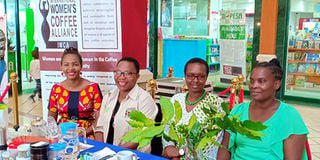BOLD WOMAN: Changing women's lives one coffee bean at a time

Getrude Okutoyi Alworah (second from the left) poses for a photo with her colleagues during an exhibition at the Junction. PHOTO| MARION MAINA
What you need to know:
- Women dominate at the farming stage earning measly daily wage yet the coffee they produce is now commonly referred to as Kenya’s black gold.
- The spoils of their tireless labour are shared out among the top ranking players in the coffee value chain that mostly consist of men.
Coffee comes a long way before it eventually reaches the cup. Plant pathologist Getrude Okutoyi Alworah knows too well the arduous process of growing coffee and how much women are disadvantaged in matters to do with coffee farming.
Despite the sweat that women in Kenya put into producing this cherished product, they gain very little from the coffee industry.
The reason for this is that very few women are involved in the post-harvest part of coffee production yet that is where the big money is.
Women dominate at the farming stage earning measly daily wage yet the coffee they produce is now commonly referred to as Kenya’s black gold.
The spoils of their tireless labour are shared out among the top ranking players in the coffee value chain that mostly consist of men.
Getrude, who works with the Kenya Agricultural and Livestock Research Organisation – Coffee Research institute has been volunteering her technical expertise to empower women in coffee farming to become more assertive in the industry.
CHANGING LIVES
In 2014, the lives of 50 women who were living in Bungoma in abject poverty changed for the better after Getrude and her colleague Dr Cecilia Kathurumia gave them 20 coffee seedlings courtesy of the coffee kitchen gardens program initiate by the two experts.
Today, through the Alliance of Women in Coffee (AWIC), Getrude has impacted over 500 women with knowledge about growing coffee, how it is processed and the economic opportunities lined up in the coffee value chain.
“Through training, we are helping women appreciate the soil-to-cup journey of the coffee bean. In the past, women would just till the land and plant coffee only to pick it when it is ready.
They didn’t even know about fertilisers despite being the ones that applied the fertiliser to the crop.
They had no idea about the value added to this coffee that they picked from the crack of dawn to sunset.
Thankfully we are changing this narrative and I am pleased to announce that we are seeing more women rise up to even sell their own coffee,” explains Getrude.
LEADERSHIP
Getrude hopes for the day when women coffee growers will be empowered to take up leadership positions in the coffee value chains and have their voices hard not only in the cooperatives but also in coffee policy formulation.
She feels that their voices have been suppressed for way to long yet they are the backs on which the Kenyan coffee stands tall not only locally but globally as well.
She hopes that along with other women experts in the field the existing knowledge gap will be bridged through technical training and information to give the woman at the farm level a fair shot to reap the maximum economic benefits of the coffee sector.
Her efforts have been recognised locally and she has recently been nominated for a Zuri Award in the Agriculture category.
Zuri Awards is an annual award that recognises and celebrates outstanding women in line with the International Women’s Day theme.
The award ceremony will be held on March 7 at Villa Rosa Kempinski.





